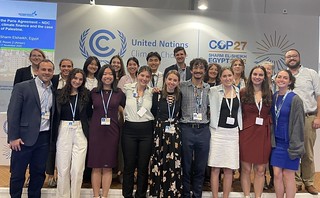 As I reflect on my experience attending COP27, there are several key takeaways I would like to discuss. My first takeaway is that I believe this experience is invaluable for both UConn graduate and undergraduate students and provides a transformative real-world component to their experience at UConn. Specifically, the UConn@COP Fellowship Program provides students direct exposure to learn about international policy negotiations, network with diplomats and business leaders, and connect with people from cultures around the world at an unparalleled scale. In 1995, COP1 had just under 4,000 attendees but this number has continued to swell with almost 50,000 attendees at COP27 making it by far the largest diplomatic gathering on earth. The scale of this conference reflects the overwhelming consensus by over 190 countries for the need to address climate change and the tremendous opportunity for students to derive value from attending this event as a springboard for professional development.
As I reflect on my experience attending COP27, there are several key takeaways I would like to discuss. My first takeaway is that I believe this experience is invaluable for both UConn graduate and undergraduate students and provides a transformative real-world component to their experience at UConn. Specifically, the UConn@COP Fellowship Program provides students direct exposure to learn about international policy negotiations, network with diplomats and business leaders, and connect with people from cultures around the world at an unparalleled scale. In 1995, COP1 had just under 4,000 attendees but this number has continued to swell with almost 50,000 attendees at COP27 making it by far the largest diplomatic gathering on earth. The scale of this conference reflects the overwhelming consensus by over 190 countries for the need to address climate change and the tremendous opportunity for students to derive value from attending this event as a springboard for professional development.
Additionally, as UConn continues to increase its role as a national leader in sustainability and climate tech innovation, the UConn@COP Fellowship Program is a critical piece of this equation. UConn’s recent announcement to achieve carbon neutrality by 2030, the creation of the UConn Climate Venture Studio in 2022, and the inaugural Global Business Leadership in Sustainability Summit held at UConn in 2022 are all important recent developments which send strong signals about the future of climate innovation and leadership at UConn and the cascading effects that will have for the state. These developments at UConn also coincide with recent legislation (Public Act No. 22-5) approved by the state of Connecticut in May 2022 which requires that the state achieve a zero-carbon electricity grid by 2040. As commitments to address climate change continue to rise globally, in our state, and at our university, this experience provides students vital access to cutting-edge knowledge and innovations that will enable students to become leaders at the forefront of this transition to deliver on these ambitious targets. Therefore, I highly encourage the University of Connecticut and its state partners to allocate additional resources and further develop the UConn@COP Fellowship Program to invest in our students as a means to empower climate innovation and leadership in the state.
Another key takeaway from this experience is that I came to realize quite clearly the United Nations COP is not just about the collective fight to address climate change, but it is a critical mechanism for fostering collaboration and dialogue with countries around the world, including those engaged in rising tension and conflict. Neglecting to participate in this dialogue is a massive setback which stifles relationships and economic ties with countries around the world. Also, while the formal negotiations are often a central focus of these COP meetings, the COP continues to play an increasingly impactful role for addressing climate change by acting as a conduit for creating agreements, facilitating the flow of capital, and disseminating innovations between countries, businesses, and NGOs. Therefore, the COP helps precipitate a much greater climate impact beyond merely the outcomes of the formal negotiation process.
If you are interested in supporting UConn students to attend future COP meetings, please consider donating to the UConn@COP Program Fund. Additionally, if you would like to become a business or organizational sponsor of the UConn@COP Fellowship Program, please contact the UConn Office of Sustainability (sustainability@uconn.edu).